Introduction and Background
Save the Rural Society (SRS) is a non-governmental, non for profit making, secular, non-partisan humanitarian and development organization. It was established in 1998 by a group of individuals who have an intimate knowledge of the precarious livelihood conditions in which pastoralist and agro-pastoralist communities were increasingly being immersed. Unfortunately, it was closed down in 2009 by the then Regional President, Abdi Mohamed Omar (Abdi Ille) for what he called “political reason”, which was actually because of the concern the executive director showed about the pervasive prevalence of human rights abuse in the region. He was subsequently forced into exile and stayed in the USA until the present regime came to power.
It was then re-registered with the Charities and Societies Agency as per the proclamation 1113/2011 Article 88/3 (with registration No 0606) and resumed its development and humanitarian activities in the Region. SRS aspires to work for and with vulnerable segments of the pastoralist and agro-pastoralist communities, tackle the object poverty that is prevalent among these communities, which resulted from and/or aggravated by, man-made and natural disasters.
Save the Rural Society (SRS) is currently implementing multi-sectoral development projects, including education, livelihoods, WASH, support for orphan and vulnerable children (OVC), health care and nutrition. It is also active in humanitarian and emergency response activities. SRS’ head office is located in Jigjiga, Somali Region of Ethiopia.
1. Vision
The vision of SRS is to see the Somali region and Ethiopia at large, become a society where poverty is eradicated, individuals and families are economically empowered, self-reliant and actively engaged in the development endeavor.
2. Mission
SRS supports the efforts of the rural poor in general, and pastoralist and agro-pastoralist communities in particular, to attain household food and livelihood security, while protecting the environment by promoting economically sound, socially just, environmentally friendly, and resource conserving development techniques.
3. Core Values
SRS’s core values include:
- Transparency, Accountability, Non-discrimination, Non-Partnership, Respect to Human Rights, Community Involvement as well as Effective and Efficient use of Resources
- Endeavors, driven by sincerity to God, compassion for humanity, commitment to fulfill its obligations to people
- A belief that the well-being of every human life is of paramount importance and efforts should be to contribute to same
- Working in cooperation and collaboration with other development and humanitarian actors that strive to mitigate and ultimately eradicate human suffering brought about by natural and/or manmade disasters, poverty and injustice
- Upholding the duty of custodianship over the Earth, its resources and the trust people place in it as humanitarian and development organization
4. Overall Objective
The overall objective of SRS is to contribute to the overall efforts of improving the living conditions of pastoralists and agro-pastoralists by building their resilience so that they can withstand shocks, supporting them to practice participatory management of their natural resources, and ensure household food security.
4.1 Specific Objectives
- Building the capacity of beneficiary communities
- Promoting participatory natural resources management (NRM)
- Contributing towards enhancement of household food security
- Identifying and promoting improved ways of livestock herding
- Promoting organic farming, indigenous knowledge and biodiversity
- Promoting the prevention and/or resolution of conflicts and enhancing peaceful co-existence of different pastoral and agro-pastoral groups
- Providing water sources in adequate amount and safety so as to reduce potential conflicts and waterborne/water related diseases
- Promoting human and livestock health
5. Thematic Areas of Intervention
SRS’ thematic areas of intervention include:
- Improvement of pastoral livelihood with special focus on income generating activities and women economic empowerment
- Agriculture and livestock
- WASH,
- IDP support,
- Education,
- Health and Nutrition
- Disaster Risk Reduction/Management (DRR/M)
- Emergency Response and rehabilitation,
- Community based natural resources management (NRM)
- Support to Orphan and Vulnerable Children
Cross cutting Issues:
- Conflict Prevention, Resolution and Peace Building
- Gender mainstreaming and promotion of Gender Equality
- Economic and Social Empowerment of Women
- Promotion of Governance, Transparency and Human Rights
Organizational Policies
SRS, right from its inception, gave due importance to the development of the organizational policies and procedure and steadfast adherence to them so as to run organizational matters in a smooth, transparent way and to avoid misconduct and negligence. It has thus put in place a number of policies. Some of the policies such as the gender policy have been translated into Somali so that all its staff, especially the support staff, could better understand and practice them. The policies include:
- Finance policy,
- Procurement policy,
- HR policy, Gender Policy, and
- Sexual Harassment policy.
6. Current Institutional Capacity
As indicated in the introductory section, SRS has been implementing several development and humanitarian projects, which have multi-sectoral nature, in different parts of the region.
Although it’s natural growth might have been constrained due to the fact that it was unfairly closed for about a decade, it was able to revive itself and become one of the strong local NGOs in the Somali Region.
Its efficiency in the implementation of the project activities and its collaboration with government stakeholders has won it the respect and appreciation of the latter. It has also won the trust and rapport of its donors and the beneficiary communities it served. It has a well-organized and equipped office in Jijiga, and Awbere. It is staffed with well-educated and experienced personnel.
7. Ongoing Intervention for 2022
Emergency Responding to the IDPs and Drought in Water Trucking and Food Distribution Project for the Drought Affected Pastoralist Communities in selected Localities in Shabeeley Wareda of Fafen Zone of Somali Region:
This project is funded and partnership with American Relief Agency for the Horn of Africa (ARAHA)
The overall objective of the envisaged emergency relief project was to mitigate the human suffering pastoral communities due to the current drought in Shebeelay warada of Fafen Zone, Somali Regional State by providing life-saving food assistance and Water Trucking
For Food distribution 385 HHs benefited from IDP and host communities and for Water Trucking 3000 households benifit
Food items distributed each family
| Rice | 12.5 | Kg |
| Sugar | 3 | Kg |
| Oil | 3 | Liter |
| Flour | 12.5 | Kg |
| Green Peas | 12 pcs | Carton |
- High deficiency for basic food items among 385 food-insecure households of the displaced and host communities relieved at least temporarily;
- Highly drought susceptible members of the target community such as children, pregnant/lactating women and the elderly entitled for basic meals of a day ;
- The diseases come as the results of the lack of nutrition decreased;
- Target communities protected from selling their basic assets to address a critical food shortage created at individual household in particular and in the community in general.
- Shortages of water among 3,000 households (more than 15,000 people) solved through ‘Emergency Water Trucking Scheme’ a period of 15 days;
- The 24 m3 of water delivered per day to individual households, schools and health centers in the five most drought affected kebeles for 15 days ;
- School dropouts happening as the result of acute water shortage maintained by water trucking to the schools;
- Risks of displacement in search of water and food reduced.
- The hygiene and health problems that may be caused by the lack of water controlled.
- Health facilities and schools got access to essential water supplies and saved from interrupting their services due to water shortages.
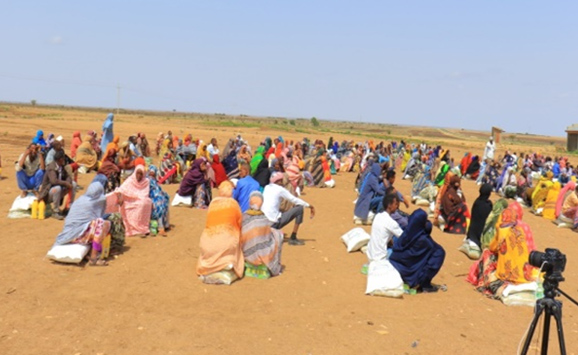
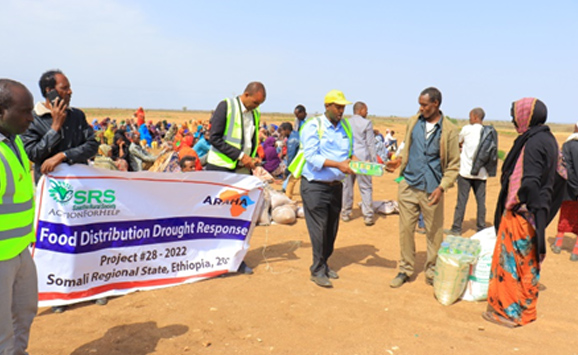
Camadhle Center food distribution Site
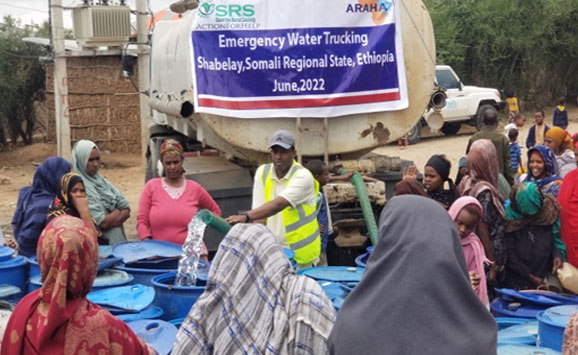
Water trucking beneficiaries receiving in Shabeeley Town Kebele 02 and Hadow Center
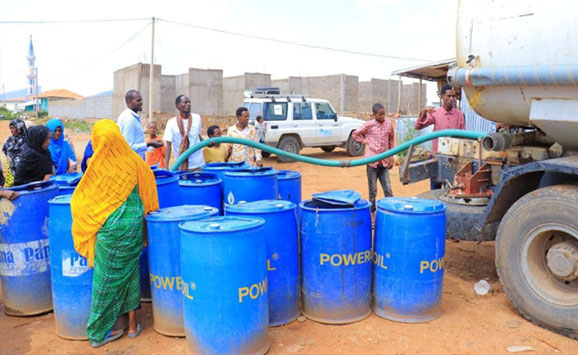
Water trucking beneficiaries receiving in Shabeeley Town Kebele 02 and Hadow Center
Emergency WASH Response project in Sagaag and Garbo Woredas of Nogob zone.
The Somali region of Ethiopia has been hit by severe drought conditions following the consecutive failures of the past three rainfall seasons-Oct-Dec 2020, March-May 2021, and Oct-Dec 2021 resulting in the displacement of people and livestock and massive loss of livestock in the region. The Somali state declared drought in 9 of the 11 regions of the state. As early as Dec 2021. 227, 9606 people required water trucking supports at 657 sites across 85 woredas. Water prices also skyrocketed compared to normal times. In the Nogob region, one of the worst-hit zones, a truckload with 24 m3 water capacity costs between 19,800 -24,000 birr (equivalent$ 328.35), a cost that is way beyond the reach of the affected populations due to the extremely low purchasing powers of the populations.
To respond to the plight of the drought-affected populations, SRS received from UNICEF emergency findings to support emergency water trucking supports, emergency latrines constructions, and NFIs distributions to 10998 drought-affected beneficiaries drawn from 4 Kebeles from Garbo and Segag woredas of Nogob zone.
Lifesaving emergency water trucking supports were provided to 4 target locations for a period of 30 days benefiting 10998 beneficiaries. The identification and prioritization of the targeted locations were done in close coordination with the respective Woreda administration officials to avoid overlap with the government-delivered water trucking supports in the woredas.
SRS deployed two water trucks with each 24 metric cube water storage capacity to the respective woredas which were used in the delivery of water to the targeted locations.
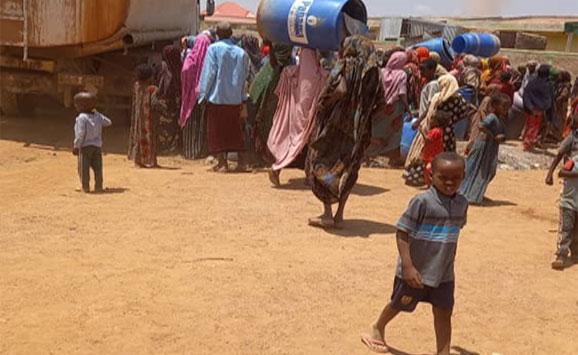
Water trucking beneficiaries receiving water from one of the water trucks hired by the project.
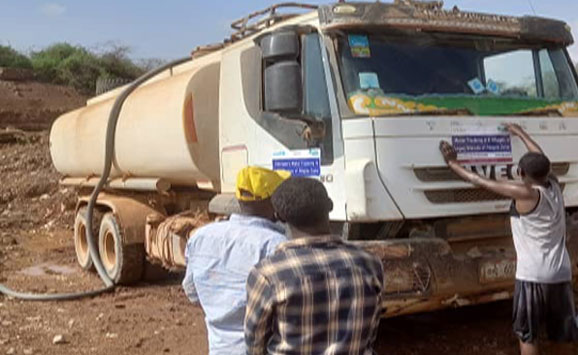
Water trucking beneficiaries receiving water from one of the water trucks hired by the project.
Construction of emergency latrines
Targeting the newly arriving drought-affected IDPs and most vulnerable community members, SRS constructed 6 blocks of communal emergency latrines in 4 target locations /IDP camps to provide basic access to sanitation facilities. Each latrine block is composed of 4 latrine stances and therefore the 6 latrines constitute 24 individual latrines stances. The latrines provided are sex designated- 3 latrines blocks for females and 6 latrines blocks for males.
Plastic latrines slabs were provided by UNICEF as an in-kind supply. The superstructure of the latrines is made of corrugated iron sheets and wooden poles/timber. The latrines provided were constructed as the drawing and technical specifications provided by UNICEF.
To encourage hand washing with soap and water after visiting latrines, each latrine block is fitted with a hand washing facility. Protection and safety needs of users especially women and girls were considered and the latrines were constructed near the homes and all the latrines were provided with safety features like internal locks on the doors.
To ensure proper use and maintenance of the latrines, SRS facilitated discussions among the beneficiary households sharing the latrines to agree on responsibilities for cleaning and maintenance of the latrines. Each latrine is estimated to be roughly shared by 50 people. A total of 1200 beneficiaries benefited from the 24 latrines stance provided by the project.
To ensure proper use and maintenance of the latrines, SRS facilitated discussions among the beneficiary households sharing the latrines to agree on responsibilities for cleaning and maintenance of the latrines. Each latrine is estimated to be roughly shared by 50 people. A total of 1200 beneficiaries benefited from the 24 latrines stance provided by the project

Beneficiary using an installed Hand washing facility on the constructed latrines

Completed emergency latrines blocks
Distribution of WASH NFIS
Hygiene kits equip the affected populations with essential hygiene items that enable them to practice good hygiene practices. 1000 WASH NFI kits were distributed to SRS obtained 1000 WASH NFIS1,000 families drawn from Gerbo (500 HHs and Sagaag (500 HHs) reaching an estimated 6,000 (1,800 Females, 1,200 males, 1,320 boys, and 1,680 girls). The 1000 WASH NFI Kits were obtained from Unicef Godey regional supply hub as In-kind support to the project.
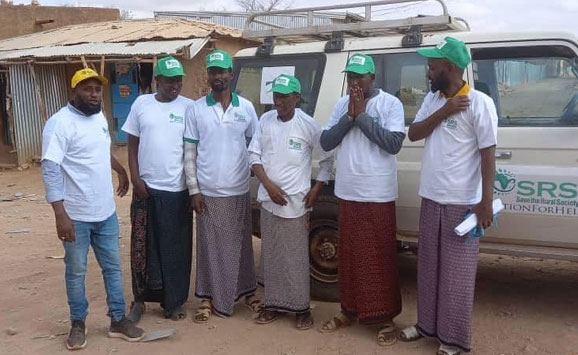
SRS volunteers and project staff in the field. The volunteers supported the implementation of the hygiene and sanitation component of the project.
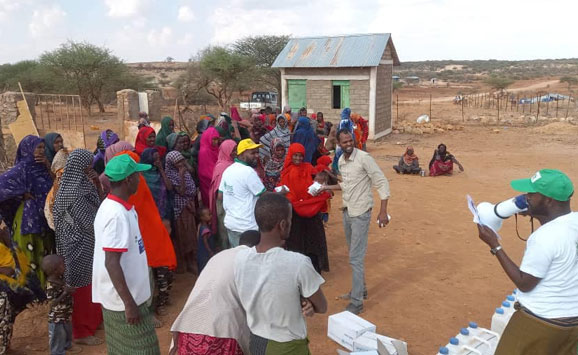
WASH NFIs distributions
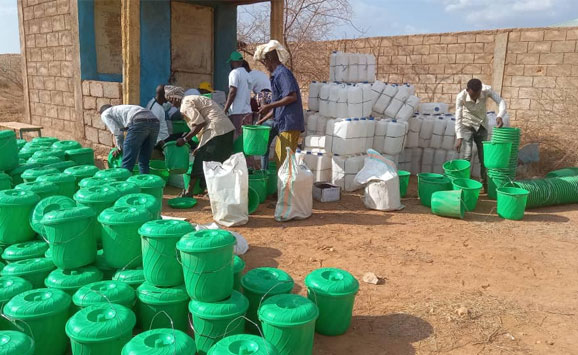
WASH NFIs distributions
SRS has been implementing the construction of sand dam and hand dug wells as well as rehabilitating several dysfunctional wells, during the years of 2020-2021, in partnership with American Relief Agency for the Horn of Africa (ARAHA) and Rootworks (RW).
Although the implementation of this Project was delayed by the restriction of travel related to COVID19, which obstructed the travel schedule of the technical staff from African Sand Dam Foundation in Kenya, who were supposed to support us in completing the project, it is now almost completed.
The construction process was well managed since the local administration and other public security apparatus provided appropriate security to the people involved in the construction and ensured the safety of the construction materials stored at the site by the contractor.
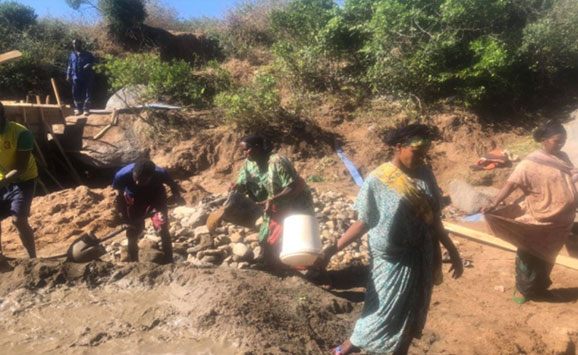
Participation of community members in the construction of the Sand Dam
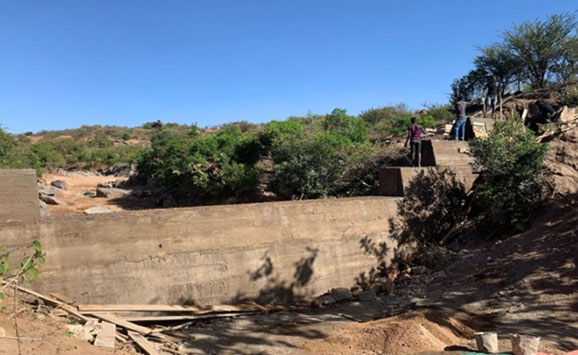
After Completion of the Sand Dam
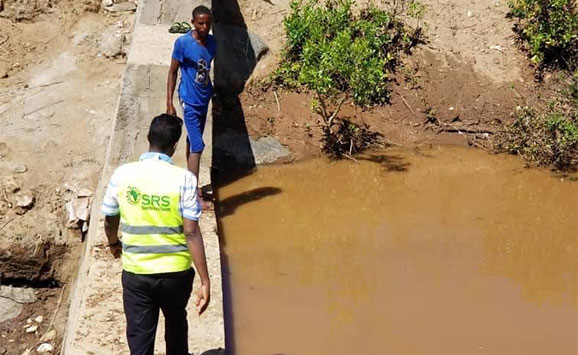
The sand dam after the first rain
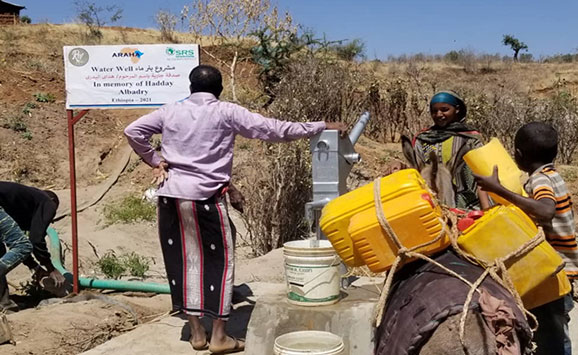
One of the Completed new hand dug wells
8. SRS’ Project/Program Implementation Strategy
SRS subscribes to the bottom-up/participatory, people-centered development approach. This approach is believed to enhance the successful implementation of the projects designed to improve the living standards of the pastoralist, pastoralist dropout and Agro-pastoralist communities. SRS also adheres to the principles of cooperation and collaboration with civil society organizations (CSOs), government agencies and local communities, which made its implementation effective and its project benefits sustainable.
SRS has also comparative advantage in implementing both emergency and development projects in Somali region as it was founded in the region by individuals who have pastoralist/Agro-pastoralist backgrounds. The organization is made to be well acquainted with the local traditions, beliefs, values and norms. More importantly, it is well aware of the invaluable advantage of utilizing the Somali clan structures and social institutions to mobilize communities, to prevent and/or resolve conflicts. In general, SRS’s implementation strategy enables it and other stakeholders to effectively contribute towards achieving sustainable development goals
9. Previous and Current Donors and Partners of SRS
SRS has worked or is currently working with, the following state and non-state actors including Somali Region PCDP, Embassy of Japan in Ethiopia, UNHCR, LWF Muslim Aid, UNICEF, ARRA, Islamic Relief UK and American Relief Agency for the Horn of Africa (ARAHA).
10. Completed Projects
Key Activities:
- Construction Of Primary School in Waaji kebele, funded by the Embassy of Japan in Ethiopia (2009-2010)
Achievements:
- Construction of Four classrooms with the capacity of accommodating 150-200 children
- Construction of two separated latrines for boys and girls
- Purchase of school furniture (desks and chairs)
- Awareness-raising campaigns together with other partners to increase enrolment of girls2.
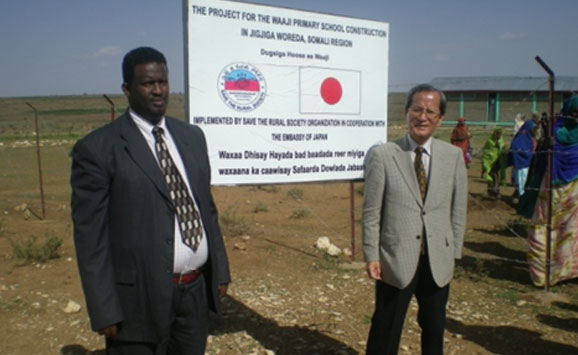
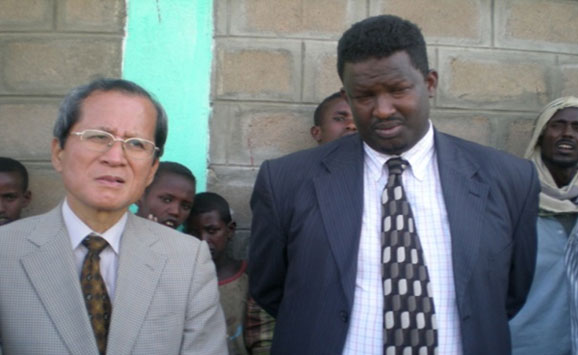
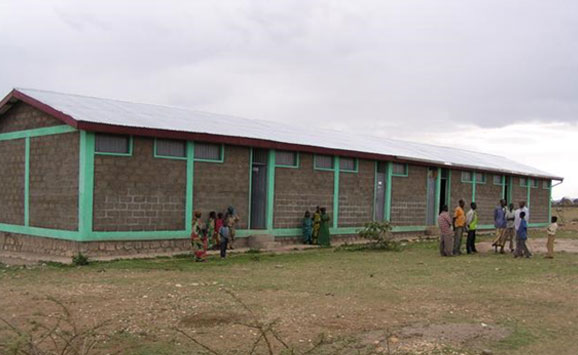
The school was officially inaugurated by H.E Mr. Kinchi Omono, Ambassador of Japan to Ethiopia and officials from the regional education office.
2. Environmental Protection in Awbere and Sheder Refugee camps and the Surrounding Host communities funded by UNHCR & LWF ( 2008-2009)
Achievements:
- Preparation of demonstrations plots and nursery sites including construction of irrigation canals and sheds, fencing as well as provision of improved seeds, fertilizers and toolkit for proper management of seedlings production
- Completed construction of hand dug well which had enough ground water yields at nursery sites to meet the nursery site water requirement.
- Trainings for women refugees on the proper management of the nursery sites
- Production of a total of 106,000 indigenous tree seedlings by women refugees.
- Provision of training to host and refugee communities on how to transplant seedlings and care for the trees.
- Distribution of 65,000 tree seedlings to refugee households for transplanting in the compounds/backyards of their houses
- 7,300 tree seedlings distributed to local community, Awbere Woreda Administration office, health facilities, schools and other public facilities
- Distribution of 1,200 seedlings to transplant inside the refugee camps
- 160 tree seedlings planted in UNHCR compound Awebere refugee camp
- 850 tree seedlings planted in backyards of SRS office, Awebere refugee camp.
3. Construction of Improved Houses for the Refugee funded by UNHCR (2008-2009)
Achievements:
- Construction of 56 improved houses for refugees in Awebere Refugee camp. (Some of the construction materials were purchased from local, trained youth organization)
- Formation of Tewkel Youth Association from host communities and development of the skills of its members
- Two members of the youth trained at Selam Technical Institute (STI) in Addis Ababa for construction skills and brick production. Onsite skills training to other youth members.
- Procurement of three manual mud-brick production machines and delivering to the youth Association from the host community trained in brick production.
- On-site skill development training for youth from host communities on construction layout including wall work, roof, door & windows design, internal decoration and finishing work
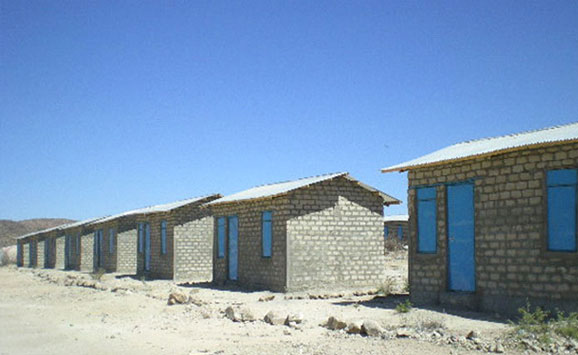
Houses constructed by SRS
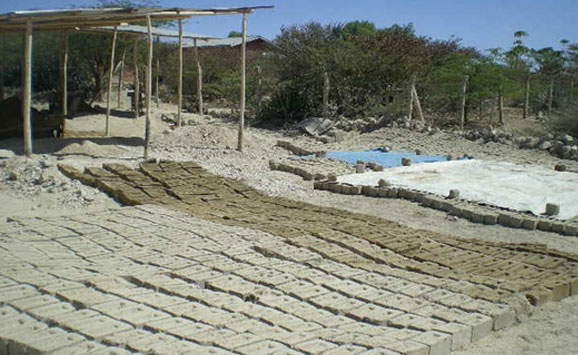
Bricks produced by trained youth associations
4. Soil conservation for Refugee Camp and surrounding funded by Lutheran World federation (2008-2009)
Achievements:
- Training on natural resource management given to a total of 30 participants from refugee and host communities.
- Rehabilitation of rangeland through Soil and Water Conservation structures within the delineated area of Awebere Refugee camp surroundings.
- 11,000 tree seedlings transplanted in soil bunds construction site
5. Horticulture and Vegetable Gardening for women refugees
Achievements:
- Provision of trainings for 50 women refugees HH heads and 12 women from host communities on backyard gardening and vegetable production
- Distribution of drip irrigation kits for 50 women from refugees and 12 women from the host community
- Provision of improved seeds, fertilizers and toolkit to 200 refugee women
6. Construction Birka for surface/runoff water harvesting in Harta Sheikh IDPs of Kabribayah Wareda and Gogti Kebele of Awbare Wareda of Somali Region. (PCDP-World Bank Project)
Achievements:
- Constructed one birka with the capacity of 48 cubic meter (48,000 lit) for local communities near by the IDPs.
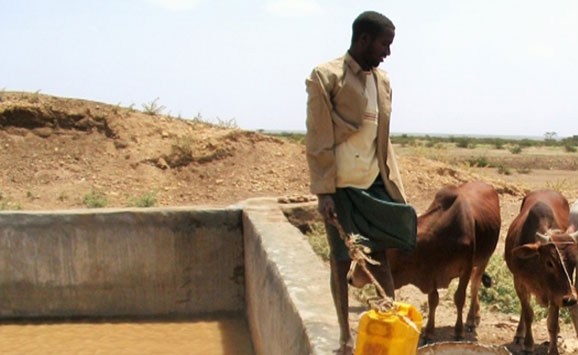
7. Strengthening of Awebere Agricultural Offices Achievements: (UNHCR,2008-2009)
- Veterinary supply support to Awebere woreda agricultural office.
- Provision of logistical support for vaccination campaigns to the Woreda agricultural office
- Training of 11 Agriculture Extension Workers (AEWs)/development agents in natural resources management (NRM).
- Two rounds of training workshop conducted for Awebere agricultural office workers and other stakeholders
8.Restocking of livestock, poultry and Beehives for women refugees (UNHCR,2008-2009)
Achievements:
- 1000 women refugee trained in Poultry Management and provided with poultry brought from Alemaya University of agriculture
- Restocked female local variety sheep (Wankey) to selected IGA women refugees
- Training in Livestock Management was provided to selected vulnerable women IGA groups from refugees
- Provision of beehives, 3 units to selected women refugee income generation groups
- Beehives Management training was provided to women refugee beehives production group.
- Carried out vaccinations campaigns both for livestock and poultry
9. Emergency Relief Project, funded by Muslim Aid, UK and Distribution of NFI to Flood Disaster affected households (2009)
Achievements:
- Distributed Plastic sheets (4X5) for shelter improvement.
- Distributed Blankets
- Distributed jeri-cans to flood displaced households
- Distributed kitchen items
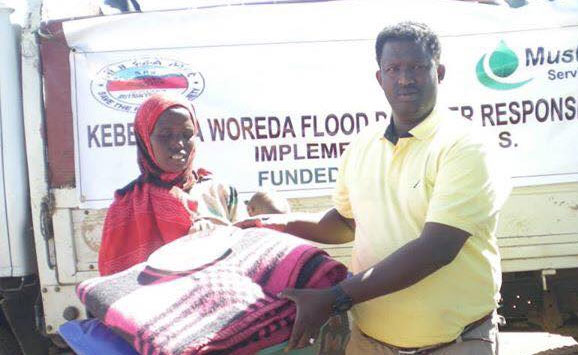
Distribution of NFIs
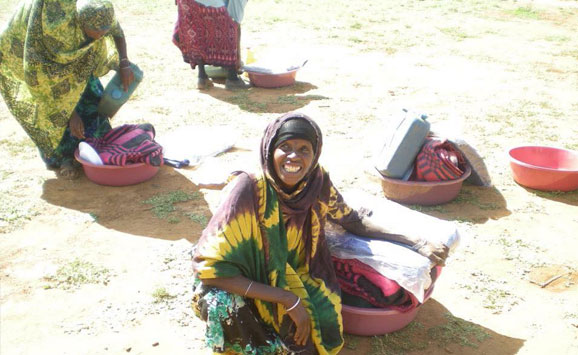
Distribution of NFIs
10. Capacity Building and Training (UNHCR,2008-2009)
Achievements:
- Trained refugee committee, Women refugee committee, Local youth association members, local religious leaders and extension agents form the host communities on conflict resolutions and natural resource management, respectively
- Strengthening local youth associations
11. The water and Sanitation Development in Gorabaqaqsa, Baarey and Kuradhaamoole waredas, funded by UNICEF (2006/2007)
With the support of UNICEF, SRS has implemented water and sanitation activities in Gorabaqaqsa, Kuradhaamool and Barey Woredas of Somali regional state. Under this projects:
- SRS has constructed 65 new hand dug wells and rehabilitated 33 old hand dug wells in Gorabaqaqsa, Kuradhaamoole and Barey woredas, whilst it constructed 26 latrines in the main school of Barey town where open air defecation was common among students.
- Constructed 28 demonstration latrines so that people can replicate similar communal latrine so as to educate people about the importance of using latrines and discouraging open defecation.
- Provided WASH training to 120 members consisting of community elders, religious leaders and school children.
- Established environmental and sanitation club in Barey School.
- The water and sanitation project improved the life of the entire population of the project area, specifically women and children.
12. Youth Initiative for Empowering Leadership and Development (YIELD) (PCI,2009)
This project aims at contributing to the harnessing the potential of the youth as active citizens for peace and development in Somali region, and set the agenda for empowerment of marginalized youth from 3 woredas with the objectives of identifying and promoting young change-makers whose leadership will catalyze the achievement of peace and SDGs in the region.
Achievements:
- Mobilized 1500 youths from 3 woreda of the Region through the process of involving youth to self-exploration and their passions in life, out of whom 900 youths were actively and voluntarily contributing to resolve issues of their community by participating in various youth led community actions
- Capacity building of young people through training on different skills with a focus on the following key areas:
- Skill to Negotiate (with self and society) adapting to external situations by adjusting in a positive manner and striking a middle path to enhance Critical and Creative thinking
- Exposure visits, interface with social and political experts. About 600 youth were capacitated and mentored as leaders/active citizens within the community.
- Facilitating demonstration of socio-political understanding through scenario writing, skits, talks and written competitions and practical involvement through thematically relevant campaigns and events.
- Networking with Government, Civil Society Organizations and institutions to advocate on identified issues and relevant programs. Encouraging and equipping youth for participating in community action programs and urban local body (ULB)
- Creating common spaces in communities where young people meet and interact with youth from different backgrounds, have fun, organize events and workshops/exchanges to explore themes of their own choice.
13. SRS’ Organizational Structure and Governance
Board of Directors
SRS is led by a Board of Directors that has five elected members, who are all distinguished personalities from varying professional and career backgrounds. The highest authority of the organization is vested upon the Board.
The Board is responsible for hiring and firing of the Executive Director, and approving the employment of others at the Head Quarters and project levels. It holds regular meetings on quarterly basis to evaluate the performance of the NGO, and solve problems encountered during that term of the operation. Besides the quarterly regular meeting a special meeting may be summoned when and if necessary.
Executive Director
The Executive Director is answerable to the Board of Directors and is responsible for the day-to day execution of the activities of the organization. Her/his responsibilities and duties include:
- Hiring and firing as well as promoting and transferring of necessary employees at head quarters and project levels in accordance with the rules and regulations stipulated in the HR Policy (with the assistance of the employment and promotion committee and the approval of the Board),
- Reporting the activities and achievements of the different projects to the Board and to Donor agencies on quarterly basis (unless the agreement with specific donors requires otherwise),
- Approving and authorizing financial transactions according to financial policy of the organization;
- Ensure the implementation of sound and effective financial and administrative management systems;
- Promote SRS to the public and donors and maintaining good relations with all stakeholders;
- Liaise with donor agencies and other NGOs, and design and implement fund-raising events
- Review proposals, medium and short term work plans, and budget of SRS and present to the Board for approval, with recommendations
- Presenting internal audit reports annually and external audit reports at the termination of specific projects.
- She/he is also responsible for resource mobilization by developing project proposals and submitting the same to donor agencies.
- She/he is mandated to sign agreements and contracts with donors and other relevant government and non-government organizations on behalf of the organization and in accordance with the organization’s bylaws.
Program Director
- The program director is responsible for planning and overseeing the execution of the activities of the various programs and projects. She/he is answerable to the Executive Director and submits periodic performance reports on financial and program/project activities to the same.
- Plan, organize direct, co-ordinate and monitor the day-to-day activities of SRS’ projects;
- Carry out such other functions that may be assigned to him/her by the Executive Director.
- Identifies and prepares donor profiles and their requirements;
- Develops fund raising systems, policies, procedures and strategies;
- Discuss policy issues, provide oversight, make recommendations and decisions on SRS’s initiatives, though the authority for making final decisions will be reserved for the Executive Director;
- Improve coordination, integration and communication across programs/projects and follow-up implementations as per strategic plan
Administration and Finance Head
The Head of the Administration and Finance Department is responsible for:
- Executing all administrative and financial works.
- Together with the Executive Director and the employment, promotion, and training committee, recruit/hire, promote, transfer staff as per the HR policy of SRS and in line with the Ethiopian Labor Law.
- Plan and implement capacity building (skills development) schemes for the employees by exploring training opportunities
- Plan organize, direct, co-ordinate, control and supervise personnel administration, procurement of materials and services, general services as well as financial and budgetary activities of the Organization;
- Formulate and recommend coherent strategies, policies, procedures and guidelines for human resource management, accounting, procurement, repair and maintenance of vehicles, and follow-up their proper implementation;
- Ensure that employee grievances are duly investigated and promptly resolved.
- Ensure that the deposit and disbursements of funds are made timely and in accordance with the Financial/Accounting Policy and Procedures of SRS;
- Advice and assist the executive director in matters related to administration, human resource development and financial matters;
- Ensure the maintenance of SRS’s official accounting records in conformity with generally accepted accounting principles and practices;
- Authorize various payments in accordance with approved budget and directives given by the Executive Director and the existing policies and procedures;
- Design and use sound internal financial control system to safe guard assets, records and documents of the organization;
- Analyze financial statements of SRS and identify problem areas, take remedial action where necessary and make appropriate recommendations to the Executive Director;
- Gives assistance to the technical staff in the development of multi-year budget;
- Prepare and review annual budget, and analyze variance in the budget along with narrative description of budgetary implementation;
- Analyze financial statements and advise the Executive Director on its implication together with possible course of action;
- Consolidate financial statements, and timely provide accounting information to external auditors;
- Ensure that financial reports are sent to donors, timely and accurately.
Contact Person:
Mr. Hirsi Mohamed
Executive Director
www.savetheruralsociety.org
